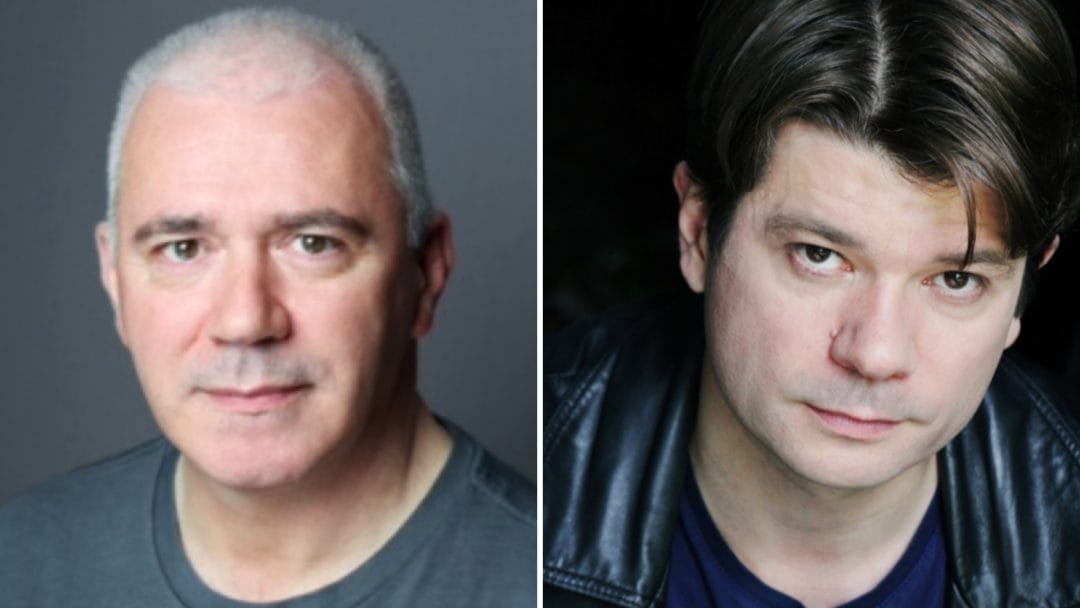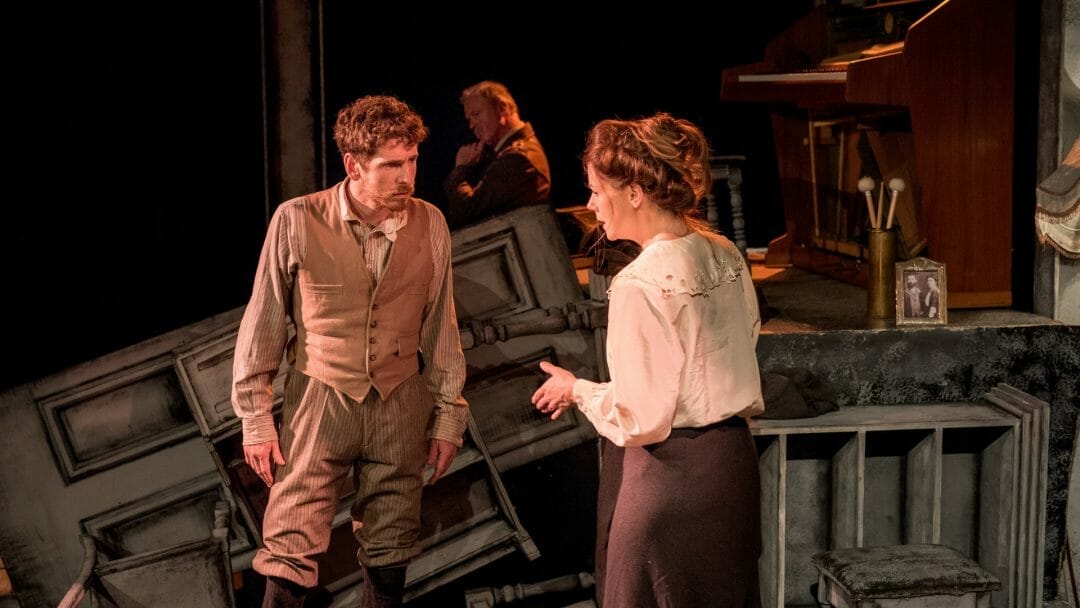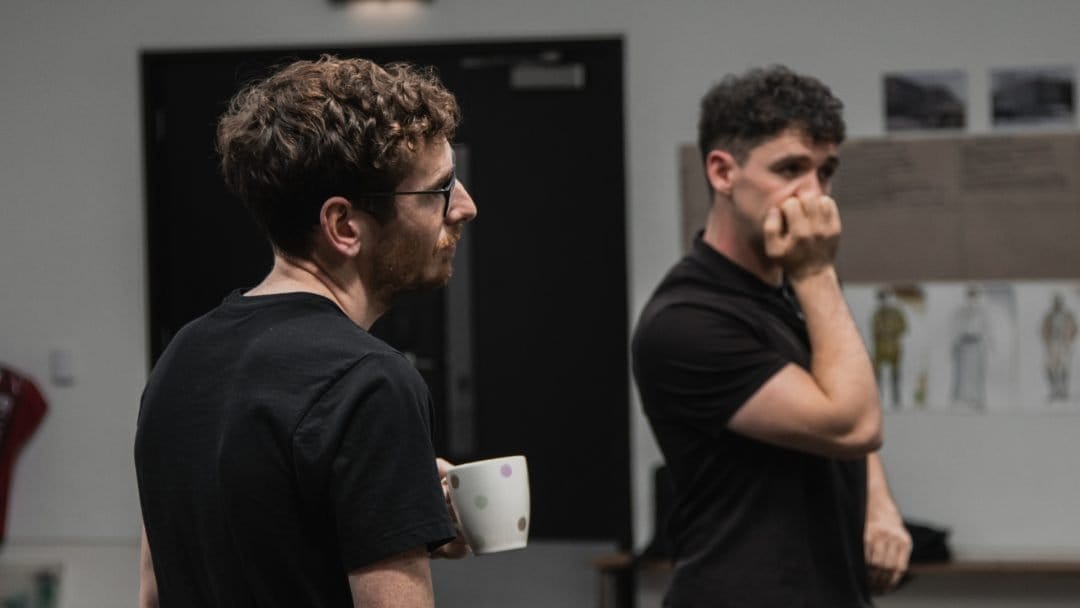Fresh from her acclaimed play Narvik winning last year’s Best New Play Award at the UK Theatre Awards, playwright and songwriter Lizzie Nunnery is to premiere her new play with songs To Have to Shoot Irishmen.
Your new play To Have to Shoot Irishmen is coming to Omnibus Theatre, what can you tell us about it?
Yeah, it’s premiering at Omnibus Theatre for three weeks from Oct 2nd, and then doing a UK tour which includes the Liverpool Everyman in my home town. It focuses on the true murder of Irish pacifist Francis Sheehy Skeffington by a British soldier in Dublin in 1916.
The narrative is intense and personal, as Frank’s partner and fellow activist Hanna tries to unravel what happened to her husband and why. We also follow the story of 18-year-old William who guards Frank the night before his murder and forms a strange closeness with him; and the story of Vane, the British officer who failed to prevent the killing. Set against the backdrop of the Easter Rising in Dublin, and the great war being fought on the front, it shows characters striving to find common ground and hang on to their humanity while the world is falling to pieces around them. It’s ultimately about the chaos that military intervention brings and the shock waves put in place. In that way it’s not only a play about 1916, it’s about what’s happening in Ireland today, and it’s about recent conflicts in Afghanistan and Iraq, and the current conflict in Syria. Francis Sheehy Skeffington wrote so eloquently about the way organised violence dehumanises all of us, and yet the great irony was that he died at the end of a British soldier’s gun.
What inspired you to write it?
I’d heard that a lot of courageous Irish women were involved in the rebellion in Dublin in 1916 and that they’d been mostly written out to history. I was keen to right that wrong, so I started doing some digging. In the National Library in Dublin I came across Hanna Sheehy Skeffington who was a trailblazing Irish feminist and friend of the Easter rebels. She was twice imprisoned and on hunger strike for her suffragist activism, she was famous for smashing the windows of Dublin castle in protest- she was just incredible. Then as I read about her I of course learnt about the terrible murder of her husband Frank, and began to ask ‘How did she live through that?’ ‘How did she make sense of it?’ ‘How did she walk through those events and keep on walking, keep on fighting?’ I basically fell in love with all four of the real-life characters and got entranced by the devastating choices they have to make. Most of us are never tested to our limits by the times we live in. I wanted to resurrect and humanise these people who were stumbling through the tide of history, reaching out, trying to make connections.
How did you go about researching the subject?
With his play, it was a lot of reading. Which I like. I have this huge file of documents. It took a long time because there was so much there. Three of the characters were writers themselves, so that was a good place to start. I also found accounts of the Rising and what happened to Frank written by soldiers and citizens who were there. Hanna toured America in 1917 talking about Frank’s death and the events around it, so through her lecture notes I could discover exactly what her opinion was of what went on. That’s really thrilling as a writer. One particularly moving moment was finding a book of military records in Liverpool University library, looking up my teenage character William Dobbin, and discovering that he was killed by shellfire on the front just months after the events of the play.
But part of the journey with the writing has been allowing myself to move away from the research and real people and fictionalise around that. All the major events are truthful and carefully plotted in the timeline of what really happened. But then no one really knows what people said to each other in those moments and days. That’s the fun of writing: to imagine those conversations, to get lost in the possibilities of what the relationships could be and how far the characters could push each other.
It’s a play with songs, why did you decide to include music?
I’m a songwriter and singer, so I often find myself working songs in to my storytelling. Music is such a gift on stage. Almost all plays use music in some way so it’s just about pushing that further and trying to make the sounds and the live approach as interesting and compelling as possible.
Music can create atmosphere, it can draw the audience into a more intimate relationship with the characters, it can show the passing of time, heighten emotion, accelerate story telling… In this instance the songs do a lot to reveal the off-stage story of the Easter Rising that is taking place while our characters confront Frank’s murder.
The sound track is a mix of songs I’ve composed with Vidar Norheim, and traditional songs written at the time, that we’ve twisted and contorted to give them slightly different meanings. People were writing songs in 1916 to comment on daily events so they’re almost like newspaper articles, giving you all the detail of the Irish nationalist rebels and their rebellion. I’m excited to present them in a new context to compel the audience to look at those lyrics, those tunes and those events freshly.
How did you go about writing the music?
Vidar and I have been writing and performing together as a duo for almost ten years now, and have a sort of telepathy when it comes to creating music. I tend to take the lead on lyrics and melodies, then Vidar will lead on the arrangements and instrumentation, and maybe push me to use a more surprising chord sequence. He’s more technical and I’m more instinctive- we’re a good mix. For this show we’re writing for mandolin, harmonium, percussion, piano and four beautiful voices. I can’t wait to hear it all performed!
What would you say to anyone thinking of coming to see To Have to Shoot Irishmen?
Having started to work with the cast and creative team, I can tell you, you’re in for something very special. The actors are all multi-talented and so driven to tell this story. It’s become a passion project for every person who’s joined the team and that’s really going to show on stage. It’s a gripping history drama with songs, that mixes gritty naturalistic scenes with abstract movement and music, and I think that’s going to be a powerful journey. We start rehearsals on Monday and I’ve already got that tingly feeling.
Plus, Omnibus Theatre is a gem of a theatre space: intimate and inviting and steeped in history. I can’t wait to get in there and get started.
To Have To Shoot Irishmen opens at the Omnibus Theatre from 2-20 October and then tours till the 6 November.
















